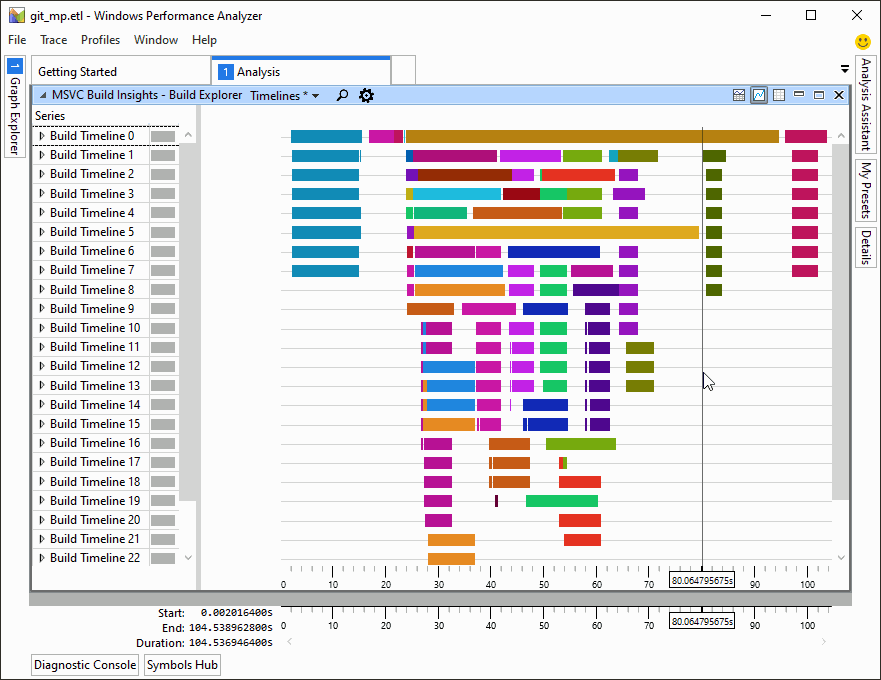Versions 16.3 and 16.4 of Visual Studio 2019 brought many new improvements in code generation quality, build throughput, and security. If you still haven’t downloaded your copy, here is a brief overview of what you’ve been missing out on.

Demonstration of C++ Build Insights, a new set of build analysis tools in Visual Studio 2019 version 16.4.
Do you want to benefit from all of these improvements? If so, download the latest Visual Studio 2019 and tell us what you think! We can be reached via the comments below, via email at visualcpp@microsoft.com, or via Twitter (@VisualC).

Demonstration of C++ Build Insights, a new set of build analysis tools in Visual Studio 2019 version 16.4.
Visual Studio 2019 version 16.3
- AVX-512 auto vectorizer support under the /arch:AVX512 switch, enabling logical, arithmetic, memory, and reduction vector operations targeting the AVX-512 instruction set.
- Enhancements to the general inliner by estimating the values of both variables and memory. Enabled under /Ob3.
- Improvements to inlining of small functions for faster build times and smarter inlining.
- Partial ability to inline through indirect function calls
- Dataflow-driven alias package added to the SSA Optimizer, enabling more powerful SSA-based optimizations
- Improvements to the common sub-expression (CSE) optimization focused on eliminating more memory loads.
- Compile-time computation of spaceship operator comparisons on string literals.
- Automatic conversion of fma, fmal, fmaf, and std::fma to the intrinsic FMA implementation, when supported.
- Optimized code generation when returning register-sized structs by using bit manipulations on registers instead of memory operations.
- __iso_volatile_loadxx and __iso_volatile_storexx functions, which allow direct atomic read and write of aligned integer values.
- Intrinsic versions of most AVX-512 functions that were previously implemented as macros.
- Improvements to instruction selection for mm_shuffle and _mm_setps intrinsics under /arch:AVX2.
- Enabling of FrameHandler4 (FH4) by default for the AMD64 platform.
Visual Studio 2019 version 16.4
- Support for AddressSanitizer (ASAN), allowing the detection of memory safety issues at runtime.
- C++ Build Insights, a new collection of tools for understanding and improving build times.
- Significant improvements to code generation time by using up to 24 threads instead of 4, depending on available CPU cores.
- Further improvements to code generation time through better algorithms and data structures used by the compiler.
- Introduction of a new /d2ReducedOptimizeHugeFunctions compiler option to improve the code generation time by omitting expensive optimizations for functions with more than 20,000 instructions. This threshold can be customized by using the /d2ReducedOptimizeThreshold:# switch.
- Improvements to the AVX-512 auto vectorizer, supporting more instruction forms: variable width compares, int32 multiplication, int-to-fp floating point conversion. Available under /arch:AVX512.
- Improved analysis of control flow to better determine when values are provably positive or negative.
- Enabling of the enhanced inliner introduced in 16.3 by default, without the use of /Ob3.
- Intrinsic support for the ENQCMD and ENQCMDS instructions, which write commands to enqueue registers.
- Intrinsic support for the RDPKRU and WRPKRU instructions, which read and write the PKRU register available in some Intel processors.
- Intrinsic support for the VP2INTERSECTD and VP2INTERSECTQ instructions, which generate a pair of masks indicating which elements of one vector match elements of another vector.
Do you want to benefit from all of these improvements? If so, download the latest Visual Studio 2019 and tell us what you think! We can be reached via the comments below, via email at visualcpp@microsoft.com, or via Twitter (@VisualC).